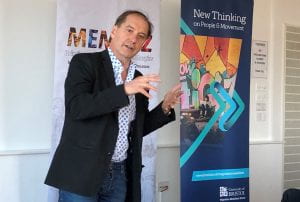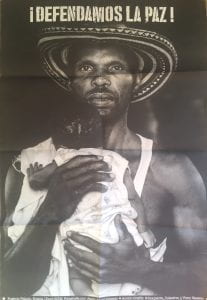By Mary Ryder
Three years on from the negotiated peace agreement between the FARC-EP and the Colombian state, MMB co-hosted members of the Colombian Truth Commission (CTC) to participate in ‘Truth, Memory and Diaspora: The Seeds of Peace in Colombia’, a week of transnational dialogue and collaboration between UK and Colombian institutions.
The University of Bristol has been working with the CTC through a variety of different collaborative projects including ‘MEMPAZ: Bringing Memories in from the Margins’, funded by AHRC, Newton and Colciencias, which supports the creative memory practices of local organisations to bring memories from the margins into Colombia’s transitional justice processes; and ‘Transitional Justice as Education’, funded by AHRC, which works to support the gender and pedagogy work of the CTC by connecting it with feminist and educational expertise from around the world.
The week of events provided a unique opportunity to hear directly from the CTC about the achievements, innovations and challenges of truth-seeking both within and beyond the national border at this pivotal time in Colombia’s history. In this blog I highlight the key messages shared.
Conflict, exile and truth-telling of the ‘Colombia outside Colombia’

Forced displacement has been recognised as a major consequence of the armed conflict in Colombia, sometimes forcing victims to leave the country and go into exile. According to the National Victims’ Registry, there are more than 8,500,000 victims of the armed conflict and 7,500,000 victims of forced displacement in Colombia. It is unknown exactly how many of them are living abroad but the UN High Commissioner for Refugees (UNHCR) estimates it to be approximately 400,000 – it is likely to be even higher.
In an evening of talks on ‘The Truth Commission and the Colombian Diaspora,’ Commissioner Carlos Martín Beristain discussed the work being done to collect testimonies in the ‘Colombia outside of Colombia’ in order to investigate how the armed conflict has been experienced by the Colombian diaspora and uncover why so many people were forced to leave. The scale of this work is unprecedented in international Transitional Justice experience.
Another fundamental aim of the CTC is to make the experiences of the Colombian diaspora, which are relatively unknown within Colombia, visible within the country’s historical memory.
How can a diaspora be involved in a truth commission?
In its first year of operation, the CTC, led by Beristain, has been working with civil society and victims’ organisations across the world to help build trust, to educate people about the CTC’s mandate and process, and to learn more about the expectations, needs and concerns of the victims. More than 120 people have been trained so far, operating within country specific ‘nodes’, to interview Colombians living in exile.
Beristain was joined in Bristol by members of the UK Truth Commission hub to reflect on their efforts to encourage UK based Colombians to give their testimony. Five of these members, including a lawyer, an academic and a priest, gave deeply poignant accounts of the stories they have heard and the challenges they have faced in encouraging people to come forward. Andrei Gomez Suarez, one of this UK based team, called on the audience to become the channel of communication between people who may want to give a testimony and the CTC. Through the discussions it was recognised that documenting so many traumatic accounts can take its toll on those carrying out the interviews.
The challenges of working in a polarised context
Beristain also outlined clearly the obstacles facing the truth-seeking processes in such a polarised context, where lies have been institutionalised, pain internalised and social fractures run deep in society. In another event that week, Gonzalo Sánchez, the former director of the Colombian National Centre for Historical Memory and a member of the Advisory Board of the Truth Commission, reflected on historical memory and peacebuilding in times of such polarisation.
Sánchez discussed the question of who produces memory work and for whom. He raised concerns that in Colombia today, memory and truth are being threatened by ‘toxic narratives’ made up of hatred, vengeance and fear, built up over years of conflict and driven by those who oppose the negotiated peace agreement. A key challenge for the CTC is to ensure that marginalised voices, which have historically been excluded and discriminated against, are heard and taken seriously by the Colombian state.
The opportunity for reconciliation

The final event of the week was a screening of ‘The Witness’ (El Testigo, 2019), a new documentary about the photographer Jesús Abad Colorado who has documented violence in Colombia for over 25 years. It tells the inspiring human stories of the people in Abad Colorado’s photographs, exploring the pertinent themes of resilience and forgiveness, and what they mean to those for whom so much is at stake. The film generates a strong emotional connection with the conflict, felt even by those who experienced the violence indirectly or from a distance.
Following the screening, Gonzalo Sánchez and Lina Malagón, a Colombian human rights lawyer teaching at the University of Bristol, reflected on whether Colombia is now ripe for reconciliation. It is time to know the truth, said Malagon, because we all have a story to tell and we need to move on.
Lessons learned
Bristol Colombia Week 2019 provided a valuable opportunity for many Colombians and friends of Colombia to learn more about the CTC and to connect with the country’s transitional justice process, and with one another, so we can support peacebuilding from afar. Truth-seeking in Colombia will not end with the culmination of the CTC’s three-year period. It is hoped that the final report produced by the Commission will create the conditions conducive to peace and will be accompanied by meaningful efforts to promote dialogue, reconciliation and coexistence on a local and national level, and beyond the national borders.
Mary Ryder (mr12859@bristol.ac.uk) is a PhD researcher in the School of Education, University of Bristol. Her research explores the conflict narratives of rural farmers in drug-producing regions of Colombia, within the country’s transitional justice processes.

